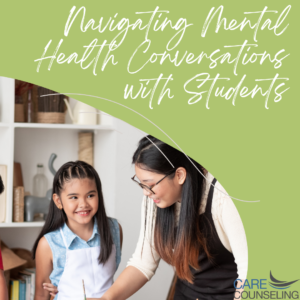Navigating Mental Health Conversations with Students
 As educators and mentors, understanding how to address mental health is not just essential—it’s an opportunity to create a supportive environment where students can thrive emotionally, socially, and academically. Broaching the topic of mental health may seem daunting, but it’s a crucial step in fostering emotional resilience and nurturing lasting connections with your students.
As educators and mentors, understanding how to address mental health is not just essential—it’s an opportunity to create a supportive environment where students can thrive emotionally, socially, and academically. Broaching the topic of mental health may seem daunting, but it’s a crucial step in fostering emotional resilience and nurturing lasting connections with your students.
Understanding the Importance of Mental Health Conversations:
- Breaking the Stigma: Talking openly about mental health reduces the stigma associated with it. When educators address it without judgment, students are more likely to seek help when needed.
- Building Trust: Addressing mental health creates an atmosphere of trust and understanding. Students feel valued and supported, knowing their well-being matters.
- Supporting Holistic Growth: Emotional well-being significantly influences academic success. By addressing mental health, educators contribute to students’ overall development.
Strategies for Addressing Mental Health with Students:
- Educate Yourself:
– Familiarize yourself with common mental health issues, their signs, and how they affect students’ lives. This knowledge helps you approach conversations with empathy and accuracy.
- Create a Safe Space:
– Establish a welcoming and nonjudgmental environment where students feel comfortable discussing their feelings. Assure them that their conversations will remain confidential.
- Introduce the Topic:
– Begin conversations by normalizing mental health. Mention that just like physical health, everyone has mental health that requires attention.
- Use Compassionate Language:
– Choose words that convey empathy and support. Show that you’re there to listen and understand.
- Be an Active Listener:
– When students open up, listen attentively. Avoid interrupting or immediately offering solutions; sometimes, they just need someone to hear them out.
- Normalize Seeking Help:
– Emphasize that seeking help is a sign of strength, not weakness. Mention resources like school counselors, mental health professionals, or helplines.
- Share Stories of Resilience:
– Discuss stories of individuals who have overcome mental health challenges. These narratives inspire hope and show that recovery is possible.
- Incorporate Mental Health Education:
– Integrate mental health awareness into your curriculum. This could include discussions, projects, or workshops on topics like stress management, self-care, and emotional regulation.
- Use Non-Intrusive Prompts:
– Instead of asking directly about mental health, use prompts like “How have you been feeling lately?” or “Is everything okay?” This gives students an opening to share.
- Offer Personal Support:
– Let students know that they can approach you if they’re struggling. Share your availability and willingness to listen without judgment.
- Collaborate with Mental Health Professionals:
– Partner with your school’s mental health team to ensure students receive the necessary support. These professionals can guide you on effective approaches.
- Teach Coping Strategies:
– Provide students with practical strategies for managing stress and improving emotional well-being. These skills empower them to take charge of their mental health.
- Promote Self-Care:
– Encourage students to prioritize self-care, such as exercise, healthy eating, sufficient sleep, and engaging in activities they enjoy.
- Address Bullying and Peer Pressure:
– Discuss the impact of bullying and peer pressure on mental health. Teach students to stand up against these issues and seek help if needed.
- Monitor Behavioral Changes:
– Keep an eye out for noticeable changes in students’ behavior, appearance, or academic performance. If you notice something amiss, reach out to offer support.
- Empower Peer Support:
– Foster a culture where students support each other. Peer connections can be instrumental in navigating challenges and seeking help.
Addressing mental health with students is a responsibility that transcends traditional teaching roles. It’s about fostering an environment where students feel seen, heard, and supported as they navigate the complexities of growing up. By approaching conversations with empathy, openness, and knowledge, educators can make a lasting impact on students’ lives.



























